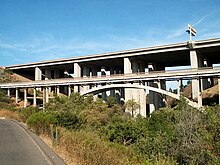Murder of Cara Knott
Cara Evelyn Knott | |
|---|---|
 | |
| Born | February 11, 1966 Ventura, California, U.S.[1] |
| Died | December 27, 1986 (aged 20) |
| Cause of death | Strangulation |
| Body discovered | December 28, 1986, near Mercy Road bridge on Interstate 15 |
Cara Evelyn Knott (February 11, 1966 – December 27, 1986)[2] was an American student at San Diego State University who disappeared on December 27, 1986,[3] while driving from her boyfriend's home in Escondido, California, to her parents' house in El Cajon. The following day, December 28, Knott's car was found on a dead-end road at the Mercy Road offramp from Interstate 15 in San Diego County. Her body was recovered at the bottom of a 65-foot ravine nearby.
Knott's killer, Craig Alan Peyer (born March 16, 1950),[4] was a police officer and thirteen-year veteran of the California Highway Patrol (CHP). At his trial, it was revealed that Peyer had been targeting women along the interstate and had made predatory sexual advances on multiple female drivers during traffic stops.[5] He was convicted of Knott's murder in 1988.
Murder

On the night of December 27, 1986, twenty-year-old Cara Knott was driving south on Interstate 15 from her boyfriend's home in Escondido, California, to her parents' home in El Cajon when Craig Peyer, who was on duty in a marked California Highway Patrol (CHP) vehicle, directed Knott to pull off the freeway on an isolated, unfinished offramp.[5] It was later discovered that Peyer also had been harassing several other female drivers in the same area by pulling them over on the same offramp, supposedly trying to pick them up as dates. In the Knott case, it was believed that the situation escalated to physicality when Knott threatened to report Peyer for his inappropriate actions. When he attempted to grab her, she slashed and scratched at his face. Peyer then bludgeoned her with his flashlight and strangled her to death with a rope.[6] He then threw her body over the edge of the Los Peñasquitos Creek Arch Bridge, where she fell into the brush below.
Coincidentally, two days later, while covering the investigation of the murder, a reporter with San Diego station KCST-TV interviewed Peyer during a ride-along segment about self-protection for female drivers. At the time of the interview, Peyer had scratches on his face which, as details of the case unfolded, were thought to have been inflicted by Knott during the struggle with him.[5] Peyer claimed the scratches were caused when he fell against a fence in the CHP parking lot, but the fence was found to be too high to have caused them. Moreover, within about the hour of when the murder was thought to have occurred, witnesses at a gas station saw a disheveled Peyer drive in at high speed. One of them, an off-duty San Diego police officer, reported seeing the scratch marks an hour before Peyer claimed he got them.[citation needed]
Investigation
Just after the KCST broadcast, nearly two dozen telephone calls, mostly from women, were received by authorities, with the callers reporting that Peyer was the officer who had pulled them over on the same offramp, even though in these cases Peyer was not hostile or violent towards them. They said that while Peyer may have been friendly with them, he also made them uncomfortable. In some cases, he gently stroked their hair and shoulders, which caused them some distress. In addition, several women had made complaints about Peyer before the murder, but these were dismissed because of his positive reputation within the CHP.
Knott last was seen alive at a Chevron gas station just two miles away from the murder scene. The attendant remembered seeing a marked CHP patrol car making a U-turn on the road just after Knott had driven away. Furthermore, Peyer's own logbook revealed a hasty falsification about the time of the murder, as well as changes he made to several traffic tickets that had been written sometime later, according to the motorists to whom the tickets were written. Forensic dentist Norman Sperber examined the rope found in Peyer's patrol car and determined they seemed to match the rope marks around Knott's neck, although Sperber was later barred from testifying about his findings in court.[7]
A distinctive and unusual gold rayon fiber—found to have been made using a yellow pigment instead of a dye—found on Knott's dress matched a shoulder patch Peyer wore on his CHP uniform.[8] Tire tracks on the bridge showed a car had pulled out hastily, leaving black marks on the pavement. A drop of blood also was found on one of Knott's boots, which was found to be consistent with Peyer's blood type (AB negative, the rarest type)[5] and other genetic markers, although conclusive DNA testing was not available at the time of the investigation. Microscopic purple fibers also linked Peyer to Knott's murder.[8]
Peyer's fellow officers testified to the defendant's strange actions following the murder, with his continuous requests for updates on the investigation's status and his attempts to justify the perpetrator's crime as a mistake.[citation needed] An internal investigation showed that while Peyer stopped many drivers for various legitimate violations, most of them were females who were driving alone. Additionally, they were of the same age group and physical description as Knott.[9]
Trials
The first trial resulted in a hung jury, after a 7-5 split in favor of conviction.[10] Upon retrial, testimony regarding a potential second suspect and a hearsay explanation for the defendant's scratches was ruled inadmissible, and Peyer was found guilty of murder, the first conviction of murder by an on-duty CHP officer.[11] On August 4, 1988, Peyer was sentenced to 25 years to life in prison.[6]
After conviction, Peyer continued to claim his innocence. In 2004, Peyer was asked if he would contribute a sample of his DNA to a San Diego County program, which had been designed and initiated to use DNA samples to possibly exonerate wrongfully imprisoned persons as such testing was not yet available at the time of his trial and conviction.[citation needed]
Peyer refused to provide DNA for the test. At an initial parole hearing in 2004 after having served 17 years, when asked why he wouldn't provide a DNA sample, Peyer refused to answer. For this reason and his lack of remorse, the board denied his parole request.[citation needed]
Aftermath
Shortly after the trial, a wave of incidents was reported when female drivers traveling alone refused to stop when ordered to by the police.[citation needed]
On November 30, 2000, Sam Knott, Cara Knott's father, died of a heart attack only a few yards from the site where Cara's body was discovered, where the family had constructed a memorial garden for her.[5][12]
Peyer has been denied parole two additional times: in 2008 (after serving 21 years),[13][14] and 2012 (after serving 25 years).[15] His next eligibility for a parole hearing is set for January 2027, when he will be almost 77 years old. Peyer is serving his sentence at California Men's Colony in San Luis Obispo, California, which is considered a "country club" and "garden spot" among California prisons. At the time of his second parole hearing in 2008, he had "a nearly unblemished prison record" and "worked as an electrician at the facility"[14] for years, making $52 per month in salary from the job in 2003.[16] He had worked briefly as an apprentice electrician after getting fired from CHP while on bail before the trial.[17][18] His third wife, Karen, whom he married 18 months before the murder and visited him regularly, divorced him around 2007.[16][14]
Media
The Craig Peyer case has been covered in several books:
- True Stories of Law & Order: SVU by Kevin Dwyer and Juré Fiorillo (Berkley/Penguin 2007)
- You're the Jury by Judge Norbert Enrenfreund and Lawrence Treat (Holt Paperbacks 1992)
- Badge of Betrayal: The Devastating True Story of a Rogue Cop Turned Murderer by Joe Cantlupe and Lisa Petrillo (Avon Books (Mm) 1991.)
- One Day: The Extraordinary Story of an Ordinary 24 Hours in America by Gene Weingarten (Blue Rider Press 2019)
The case was also the subject of a few episodes of different television shows:
- City Confidential: "Badge of Dishonor" (2003)
- Unusual Suspects: "Betrayal of Trust" (2011, Season 1, Episode 2) - Investigation Discovery TV series
- Forensic Files: "Badge of Betrayal" (2004, Season 9, Episode 08).
See also
- Cara Knott Memorial Bridge
- List of solved missing person cases
- Police misconduct in the United States
References
- ^ "Cara E Knott, Born 02/11/1966". California Birth Index. Archived from the original on March 16, 2021. Retrieved January 2, 2016.
- ^ Bledsoe, Greg (December 27, 2011). "Mom to Face Cara Knott's Killer". NBC San Diego. Archived from the original on March 4, 2016. Retrieved January 1, 2016.
- ^ Sinha, Shivangi (November 13, 2023). "Craig Alan Peyer: Where is Cara Knott's Killer Now?". The Cinemaholic. Retrieved May 29, 2024.
- ^ Profile of Craig Peyer, caselaw.findlaw.com. Accessed 18 October 2022.
- ^ a b c d e "Badge of Betrayal (Season 9, Episode 18)". Forensic Files. truTV.
- ^ a b Reza, H. G. (August 4, 1988). "An Emotional Judge Gives Peyer 25 Years for Killing Cara Knott". Los Angeles Times. Archived from the original on March 7, 2016. Retrieved December 29, 2015.
- ^ Menn, Joseph (September 16, 1988). "Top Forensic Dentist Sinks His Teeth Into Tough Crime Cases". Los Angeles Times. ISSN 0458-3035. Archived from the original on October 5, 2018. Retrieved September 21, 2018.
- ^ a b Reza, H. G. (February 2, 1988). "Jurors Told Fibers Link Peyer, Knott". Los Angeles Times. ISSN 0458-3035. Archived from the original on September 20, 2015. Retrieved September 21, 2018.
- ^ "Former CHP officer who killed San Diego State student in 1986 could see early release from prison". cbs8.com. August 25, 2020. Retrieved November 10, 2021.
- ^ Littlefield, Dana (January 11, 2012). "Killer in 1986 Knott case denied parole". The San Diego Union-Tribune. Archived from the original on December 10, 2020. Retrieved December 26, 2020.
- ^ "Timeline 1986". Archived from the original on November 7, 2009. Retrieved November 14, 2009.
- ^ Perry, Tony (December 2, 2002). "Sam Knott; Father of Murder Victim". Los Angeles Times. Archived from the original on March 7, 2016. Retrieved January 1, 2016.
- ^ Moran, Greg. "Former CHP Denied Parole Four More Years". Archived from the original on October 21, 2013. Retrieved August 18, 2014.
- ^ a b c Moran, Greg (February 1, 2008). "Parole board declares Peyer a risk, keeps him imprisoned". The San Diego Union-Tribune. Archived from the original on September 15, 2018. Retrieved September 15, 2018.
- ^ "Board Denies Parole for Ex-CHP Officer Craig Peyer". ABC 10 News. January 11, 2012. Archived from the original on July 19, 2013. Retrieved August 18, 2014.
- ^ a b Petrillo, Lisa (February 20, 2007). "The Killer Cop". San Diego Magazine. Archived from the original on November 4, 2018. Retrieved November 3, 2018.
- ^ "The Region". Los Angeles Times. June 4, 1987. Archived from the original on March 16, 2021. Retrieved September 15, 2018.
- ^ Reza, H. G. (June 5, 1987). "Firm's Owners to Keep Peyer on Job Despite Threats". Los Angeles Times. Archived from the original on March 16, 2021. Retrieved September 15, 2018.
External links
- 1988: A California Highway Patrolman Is Tried Once Again for a Shocking Murder Under the Freeway
- 2004: The Killer Cop
- 2004: Killer Peyer refused prosecutors' offer to test DNA
- 2004: Parole board to revisit Knott murder
- 2008: No Clemency for Peyer Archived June 6, 2014, at the Wayback Machine
- 2012: Parole denied for CHP officer
- Memorial page for the victim, Cara Knott via Internet Archive
- Video showing the SD Crime Victims' Oak Garden built at the scene of Cara Knott's murder. Directions included on YouTube
- California Department of Corrections and Rehabilitation Inmate Locator
